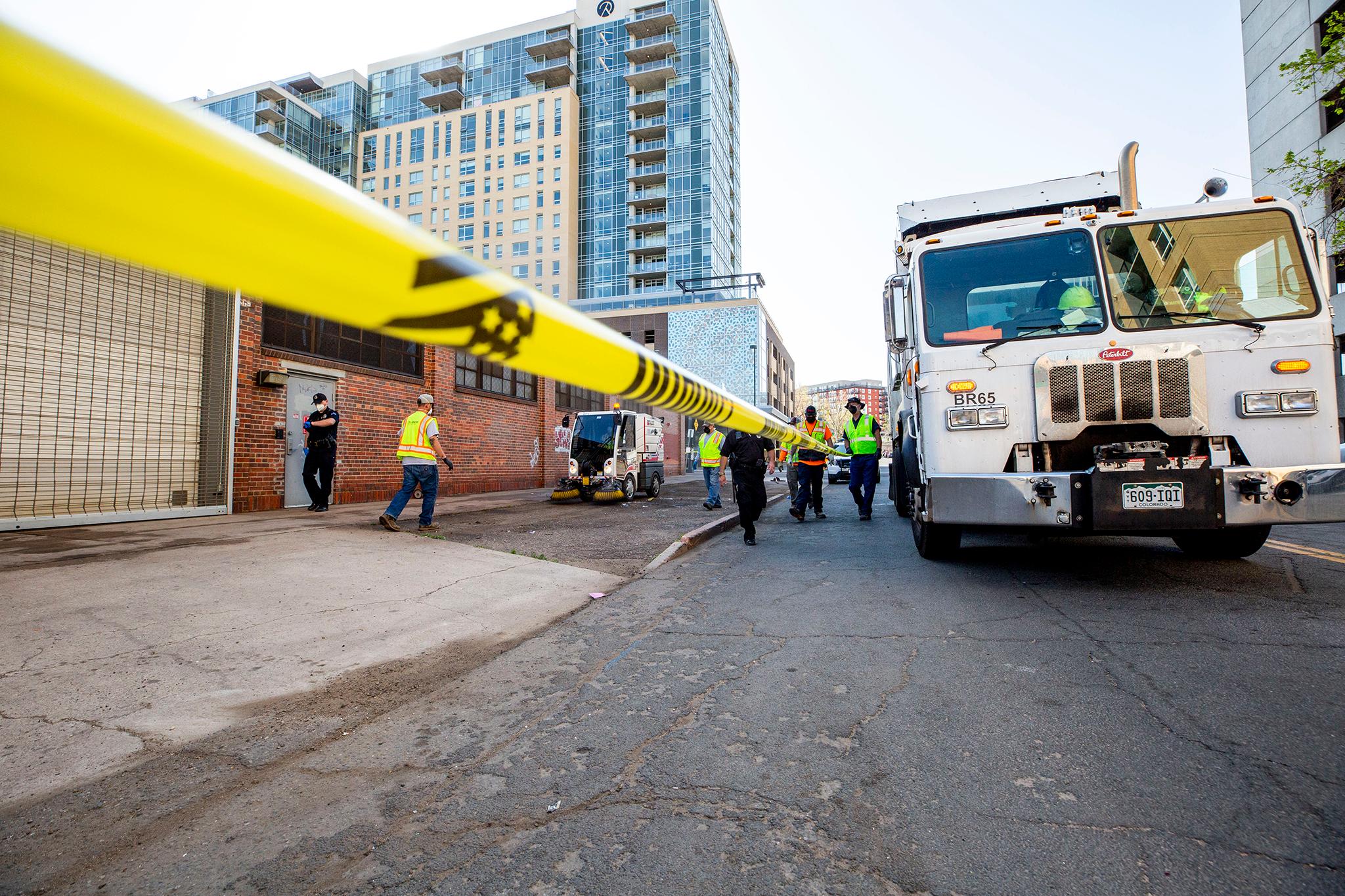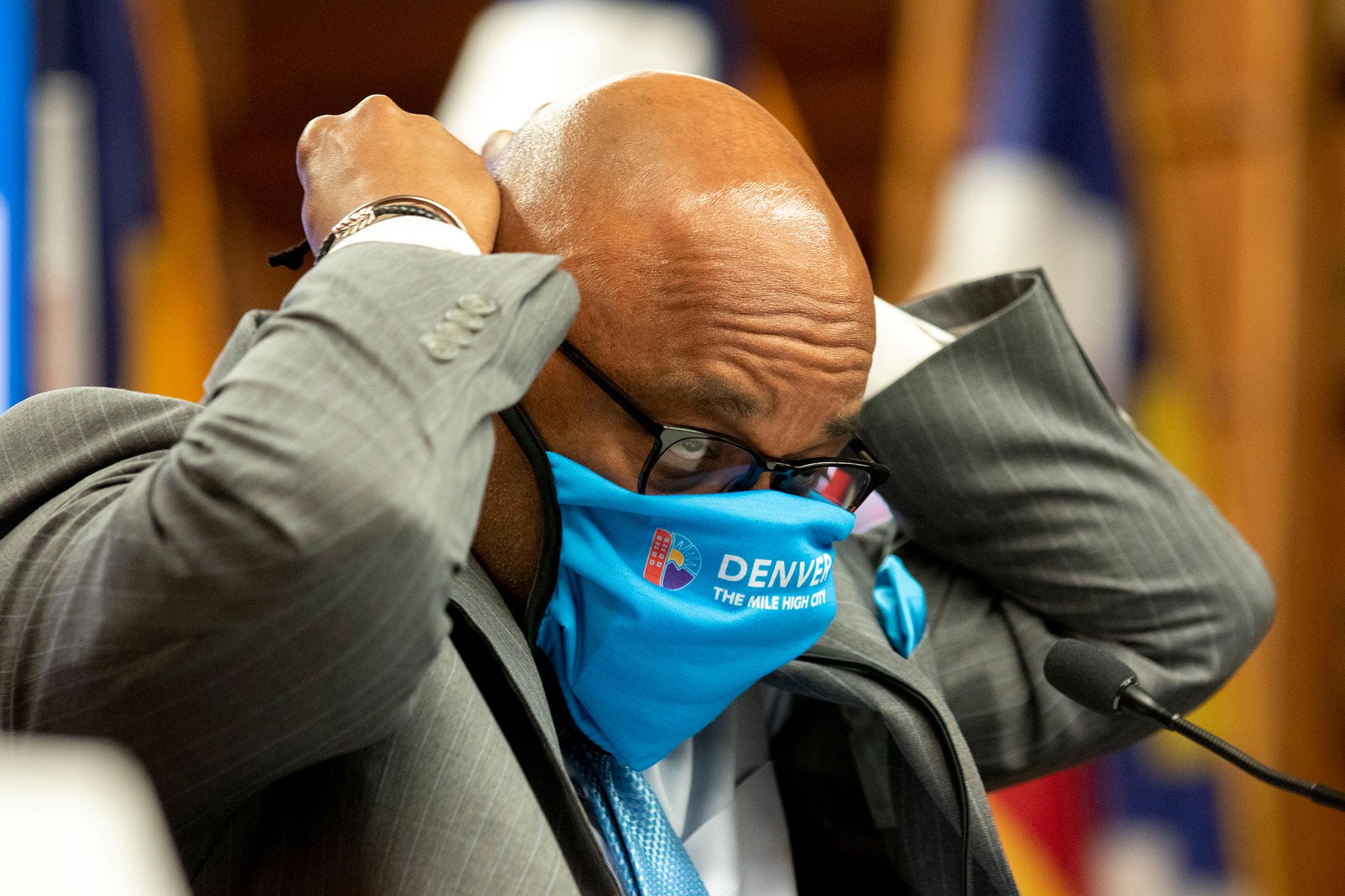On Monday, Colorado Matters host Ryan Warner interviewed Mayor Michael Hancock days after Denver transitioned from stay-at-home orders to the safer-at-home phase of reopening the city. Hancock talked about the indicators he’s watching to monitor whether Denver should reinstate stay-at-home orders, whether the city can offer parents who are ordered to go back to work any childcare, and a busy scene restaurant scene in Castle Rock that made national headlines.
This interview has been edited for brevity and clarity.
A video that has gone viral shows a jam-packed restaurant in Castle Rock on Sunday. No social distancing, no masks — that violates public health orders. Did you get reports of anything like that happening in Denver? Are you generally pleased with what you saw and heard on the first weekend of the safer-at-home phase?
I saw those images on the news as well. We have not had any reports of those sorts of things happening here in Denver. And I got to tell you how pleased I am with Denver businesses and the people of Denver who really complied for the most part with our orders. There are instances where people maybe are not wearing their masks when they should be, but for the most part people are compliant. That’s really been the reason why we can begin the process of considering reopening the city on a very slow, rolling basis — one that is thoughtful, that takes into consideration the priority of keeping people healthy and safe. I was real disappointed to see what happened in Castle Rock. I hope the public health officials take the right steps to send a very strong message that that is a sort of thing that can not be tolerated as we try to keep people safe.
If you saw something like that in Denver, I imagine the enforcement response based on what you just said would be swift.
It has to be. You have to send a message that this is not about anything but protecting the health of people in your city, in your county. And that was disappointing.
I’ve watched first responders really put their lives on the line to protect people, to help and serve all of us. I’ve seen essential employees show up and do everything they could to protect themselves as well as their coworkers. I’ve seen neighbors, as I did this weekend, walking in grocery stores — I was thanking people for wearing their mask if I happened to walk by them. Thank you for wearing your mask, because you wearing your mask protects me.
I think the county has to send a very swift and strong message that you cannot willfully disregard the orders. It will not be tolerated.
You have said that easing Denver’s stay-at-home order hinged on increased testing and more contact tracing. That’s essentially the gumshoe work of tracking down how COVID-19 might be spreading. Is that about looking for hot spots and flare ups? Is that your intention?
It is. It’s about making sure that we know how the virus is impacting the community. We’re stepping up the capacity to test, and we hope to continue to remove barriers for people accessing those tests. As quickly as possible, with a couple of techniques and strategies, we’re putting a mobile testing unit out into the community and getting to people who can’t travel to their clinic or doctor and removing the requirement for people to have a doctor’s order to get a test.
As we do those things, we can expect that the number of presumptive positive cases will rise. Now, the key is for us is to be able to track and to box in this virus. Who were you in contact with? Let’s make sure we’re notifying those individuals, and then we can begin to again to blunt the transmission of the virus between the folks that you had contact with.
The whole goal is to find hot spots, to address them as quickly as possible, and to make sure that we block the spread of the virus
A Twitter users asks: Do you believe Denver could potentially be hit hard with another wave of outbreaks this year?
I think every community understands that there is a possibility that that could happen. But the whole goal is to make sure that you have the testing and contact tracing in place, because you want to be able to know where the virus is and to be able to address it very quickly to remove barriers to accessing the testing. That’s critically important. Then we roll out the reopening of the city and the operations of the city in a very thoughtful, methodical, systematic process so that we are slow and we’re monitoring the metrics necessary to understand if we’re seeing spikes.
Tell me what indicators you watch to say we need to tighten back up. Is it a question of hospitalizations?
It’s all those things. And you know, the first thing that we have to do is to make sure that it’s not about politics, and nothing trumps the protection of the people in your community. The public health administrators are the folks that I lean on heavily for advice and guidance and counsel on these decisions. And what they’ve told me is that they will look at a diversity of metrics, including hospitalizations, the testing, how many people are we testing, how many people are we seeing with presumptive positive results, hospitalizations, and obviously, the other end of that, the fatalities as a result of the disease or the virus in our community. If we see five consecutive days of dramatic spikes in those categories, then we will manage again the shut down of the community. We’ll continue to monitor that very closely on a rolling basis, but also to be smart, and the only way we avoid that is, again, people following the orders, washing their hands, wearing masks, keeping physical and social distancing. If you’re feeling sick, do not go to work, stay at home if you don’t have to go out. If you can work from home that’s even better.
Another Twitter user wonders if Denver plans to make antibody testing a part of its long-term plan for reopening — that is, seeing who’s had COVID-19 and who hasn’t. Just a few provisos here: That testing has so far been unreliable, and there is no real proof of immunity at this point or how long immunity might last. But do you see antibody testing as key to this?
Yes, it is. It is very key to it. Everything I’ve heard from public health administrators and medical professionals is that you have to have antibody testing. And as we continue to learn more about our body’s response to this and whether or not we become immune after having a contact with the virus and having the virus itself in our system, we’ll continue to learn more. But the reality is is that you have to have both types of testing in the system to best manage the system and learn about this virus as well.
Is there much antibody testing going on in the city and county of Denver at this point?
There are some institutions, yes. National Jewish health is doing a lot of antibody testing. St. Luke’s Presbyterian hospitals are doing a lot of antibody testing. There are a lot of private companies that are doing a lot of antibody testing for companies as employees are getting ready to go back to work. So there’s a, there’s some testing antibody testing going on in the city.
In Denver, safer at home really changes nothing for restaurants and bars. They’re either closed or doing carry out. Libraries and gyms remain shuttered. All of this is true through at least May 26. Can you tell us anything about your plans for their reopening? Maybe we unpack that individually: restaurants, libraries, gyms.
As we’ve said from the beginning, the whole idea of the stay-at-home order was about flattening the epi curve and making sure that we can get a control of the spread of the virus in our communities. When you couple that with social and physical distancing, you see what’s happened in Denver: a flattening of the curve and management of the transmission. Right now, we don’t necessarily have the strategies in place where more people can come together, like in restaurants like we saw in Castle Rock this weekend. We are working on almost a daily basis with the restaurant industry — those places where you have a gathering of people — to come up with the strategies to create an opportunity for those restaurants and other places like that to open up while people can keep their physical social distancing as well as to make sure they receive exemplary service, which is very important.

So those conversations continue. It sounds like you don’t have any specific date at this point or a plan to reopen libraries, which are fairly essential for some, and gyms.
Absolutely. We want to get them open sooner rather than later, but we gotta make sure that the right protocols are in place.
Do you expect to see the economic scars of this pandemic in empty storefronts and vacant office space across the city? Is that the vision you hold in your head of the reality of this?
We’re beginning the process of really trying to manage the economic impact of this pandemic and its impact on Denver and the state of Colorado. There will be some casualties. As I’ve learned from talking with the restaurant businesses and small businesses, there’ll be some businesses that will not open up. They’re gone permanently. That’s unfortunate because obviously that’s never something that we want to see happen. But we had to respond to the health crisis that we were facing. We know it’s going to be years, probably three, four years, before we rebound completely from this challenge. The airport is forecasting three, four years before getting back to where we were prior to the pandemic.
This is going to be a journey. We’re going to have to take our time, be smart about it, and recognize that we’re coming from the depths that are even deeper than what we saw in the Great Recession as we try to rebuild this economy. But that’s also why it’s important for the federal government to play its role in helping cities and states to recover from this disruption in our economy. Cities represent 91 percent of our GDP in this nation, and there is no national recovery if you don’t get cities recovering.
Are you lobbying Washington for some specific municipal support?
Absolutely. There’s another stimulus bill pending before Congress right now, and the House of Representatives is working with mayors across the nation. I’m on the phone daily with mayors. We recognize that through no fault of our own, because of this pandemic, cities and economies are devastated. Denver was doing really well prior to this pandemic, and now, we’re looking at mass unemployment, companies closing, and our revenue streams greatly disrupted. We want to get cities up and running as the first sign of recovery. Again, 91 percent of your GDP in this nation comes from cities. If the president and Congress are wise, they’ll do everything they can and get metropolitan economies up and roaring again because they know that when they roar, the nation roars economically.
As you describe it, the economic effects of the pandemic will be severe and long term. I think it’s likely that we could see homelessness increase. And on the subject of homelessness, the Centers for Disease Control recommends not clearing encampments during the pandemic unless individual housing units were available. Even with extra shelter space and hotel rooms, your own housing department has said thousands more hotel rooms are needed. Yet your administration is clearing homeless camps. Why not follow the CDC on this?
First of all, the CDC was not an order. It’s guidance. We thoroughly review and vet the guidance from the CDC. And let me correct you on one thing: We’re not clearing the homeless encampments. We have gone in to clean them because they present a public health threat, and the public health department and the city has identified threats. We went into clean the encampments for the safety and the health of those individuals. It’s very important that we not allow for public health threats to exist even in the midst of a pandemic because one, they can exacerbate the spread of the virus, and we are seeing the spreading of the virus among our homeless community.

There’s lots of guidance that you follow from the CDC. Why have you taken a different approach to this particular guidance?
We didn’t take a different approach. In fact, we stopped clearing the encampments prior to the pandemic. If an encampment came up, we’d follow protocols to give notification, then we would move in and would clean up and break up the encampment for the public health and safety of the individuals.
We’ve not cleared the encampment. When we feel that there’s a public health threat as deemed by the public health administrator, we will go in and clean the encampments. Unfortunately, we’ve seen certain encampments deteriorate substantially, and we just cannot and will not tolerate that in Denver
Denver has closed some streets to through traffic and tens of thousands of people are using the streets for walking and biking. Late last week, Seattle’s mayor announced that he was permanently closing 20 miles of streets to automobile traffic so that residents can exercise. A Twitter user wants to know if Denver will do the same.
Some will open, some will not. We’re going to take a look at this pilot that we’ve rolled out here in Denver in terms of shutting down some streets. Denver was one of the first cities in the country to do this as part of the response to the pandemic. Seattle may have been a bit ahead of Denver, so we’ll take a look at the experiments and see how it goes for us.
Where everyone wants a street that we did permanently close was Bannock street between Colfax and 14th Streets. It’s being turned into a city plaza right now. That’s something we can look forward to, to begin to really enjoy. But we do find some benefit in some of the management of the operation of some streets in the city. And we’re gonna take a serious look at how that experiment has gone. So I celebrate our Department of Transportation Infrastructure, under the leadership of Eulois Cleckley, who really took this idea, vetted it, managed it and rolled it out for the people at beginning of this challenge in our city.
What I don’t hear is a full-throated embrace of a permanent change to those who are longing for that. What do you tell them?
We gotta know how it impacts our city. And that’s what we’re doing during the pilot. Seattle may have been in front of Denver in terms of the timing of this, but we were one of the first cities. And once we take a look at the data and what will work, obviously we advocate for pedestrians and people getting out and exercising and enjoying the fresh air. And if we can do that with a good balance of allowing for good traffic flow for those areas, then we’ll make it happen.
I want to talk to you about parents because it strikes me that with the change of orders, they may be asked back to work and yet their kids still can’t be in the classroom. It’s a huge childcare issue, especially for families with kids who are too old for daycare but too young to be left home alone. Is there anything at all that a city can do to address this?
There’s still a lot of concerns and a great deal of hesitation by operators to continue to operate their facilities. It’s about how this virus affects our children and how it spreads among our children. And so to your point, it has kind of limited the number or the amount of seats for childcare. But we’re limited in terms of how we can respond as a city. The children’s affairs division in the city of Denver has convened a childcare task force that has school teachers and early childhood providers and preschool programs and nonprofit agencies coming together to try to address this issue. There’s an opportunity here, and if there is a silver lining in the midst of this pandemic, it has not only been to see how we as a people responded to take care of each other, but see how businesses and employees have figured out that we can probably do more around the areas of remote working, particularly as families are challenged with a lack of classrooms and childcare availability.
On the other side of the epi curve is for employers to really take a strategic look at how they can stagger their employees physically inside the workplace and maybe continue to allow folks to work remotely. At city of Denver, 90 percent of our employees worked remotely during the stay-at-home order. And we have learned something really good, and that is that we can have our employees continue to be productive and deliver the services to the people while allowing some of our employees to work remotely. We’re going to extend that opportunity, and going forward and we’re going to master it and create a new opportunity for the city of Denver.
So it sounds like there is a limit to what a city can do. You’ve no doubt heard that Denver Health doled out millions of dollars in bonuses to more than a hundred of its administrators. And this was just as the medical center asked its employees to cut hours and take unpaid time off. These were performance bonuses for meeting goals in 2019. Denver Health has said it will do a global review of its compensation plan. Do you think that’s enough? Do you want more action taken as a result of this?
They need to do the review. I certainly support that. I’ve spoken with not only the CEO of the hospital, but members of the board. This was a very unwise decision by the board and by the administration to execute these bonuses at this time. Clearly it’s something that they should have been wiser about. The timing was absolutely awful, and I did not mince my words when I spoke with them.
Something that they’re going to have to work to deal with is regaining the trust of not only the public, but I think of their employees who feel frustrated by what has happened here. They’re going to be working to come up with strategies to respond and respond appropriately, even more in depth, to this. It’s just a difficult situation, and we’re going to continue to monitor how they address it. We have a governmental partnership with them. The city makes a tremendous investment every year in the hospital. I’m responsible for appointing members of the board.
Would you like to see a change of leadership at Denver Health?
That’s not what I’m advocating. I think Dr. Weinstein is a capable leader. It was just a very bad decision, at least in terms of allowing these bonuses to go forward. And she recognizes that, and she’s working to rectify it.














